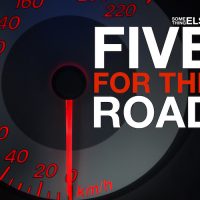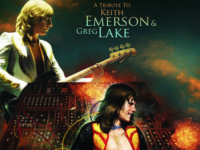Billy Sherwood’s inventive new concept album Citizen is available now. Each of 11 songs follows a central character, “the citizen” who is reincarnated into different periods in history, experiencing the time he’s inhabiting, whether it be as a WWI soldier, an American Indian on the trail of tears, or a stock broker during the market crash of 1929. It’s a vehicle that allows Billy to delve into many emotions with matching soundscapes, leading the listener to experience the triumphs and tragedies of man’s history. Billy plays almost all instruments on the album including bass and drums on every track but the opener “The Citizen,” which contains the last recording from Yes bass player and long time Sherwood collaborator Chris Squire. Billy also adds guitars and keyboards on many tracks, joined by an A-list of collaborators like Rick Wakeman, Steve Hackett, Patrick Moraz, Geoff Downes, Steve Morse, Jon Davison, Alan Parsons and more. Billy Sherwood joined us for a new Something Else! Sitdown to discuss his new album, and his role with Yes going forward …
DOUGLAS HARR: Citizen has so many guest musicians. How much of that was done in person, and what was your process for getting it all on record?
BILLY SHERWOOD: Well, file-share is a big part of the world we live in. If we tried to pull together a record like this back in the day it would be a very, very expensive process, traveling around, shuffling tapes. The way we do it now is doable. I recorded [Yes frontman] Jon Davison in my house, and I went to Alan Parsons’ studio to record his vocal for “Empire.” For the track “The Citizen,” which features [late Yes co-founder] Chris Squire on bass, we recorded at a Holiday Inn near his home. Since I carry my mobile recording studio with me on the road, I just set up in the hotel and turned it into my studio for the day, and he did a great job.
The thing about working with artists on this level, is they know exactly what to do. I don’t need to be sitting over their shoulder saying “it’s a B-flat!” They can figure that out on their own. I really just lay out the format of the songs and tell each musician to feel free, to add anything else they want to interpret to the song, to add their stamp on the piece in any way they think improves the song. I’m always thrilled when I get these files back, because they are consistently great. I sit there smiling to myself when I listen to it all. It’s a blessing to have these kinds of players on my record.
When you listen to the song “The Great Depression,” it wouldn’t be that song without [former Yes keyboardist] Rick Wakeman adding that great piano work. He enhanced that melancholy feeling to the whole thing. I said to Rick when I sent the file, “This is about a guy who’s at the end of his rope. This citizen is reincarnated as an investment banker from the Great Depression, and he’s lost it all and is about to take his own life.” It made me sad to sing that song; even though it’s a fictional character, I was feeling for that guy. That’s something about music that’s important, to evoke those emotions from the listener. The track is very melancholy and instead of a synth solo, Rick’s piano piece was exactly what I was looking for.
Everyone on the record delivered that same quality and expertise, their performances accentuated the lyrical content. These guys have been doing it for so long, they’re not playing it for their ego; they’re playing for the song. And that’s what music is all about — to make the song shine and there are many components that do that. A guitar player coming in and shredding over the top of something to show his chops is not what it’s always about. It’s about lending the right notes and vibes to the track. They know exactly what to do.
DOUGLAS HARR: “Trail of Tears” is another standout track, and features [fellow former Yes keyboardist] Patrick Moraz on keyboards sounding as amazing as he did back in the day.
BILLY SHERWOOD: He played some amazing melodies that lent themselves to the emotion of the song. When I saw him in Florida recently, he was raving about what the lyrics meant to him and how he loved being involved. The lyrics are kind of heavy, talking about the trials and tribulations of the American Indians and what they went through at that time, and it moved him. He was expressing that to me, and so translated those emotions into his work.
I wanted the listener to be able to put on headphones with eyes closed, to have a sense of becoming the citizen, in that moment — and to be transported into that time period and feel that emotion and trepidation, or joy or whatever the case may be. I’m happy with the way it came out in that regard. It’s a concept that could be taken further with more records. There are so many amazing moments in world history. With an album, you only have so much time to speak and there is a lot more that could be said with this character. I tried to key into these monumental moments in history that were not only profound for the Citizen character, but for all of us. For this record, I chose what I thought would be interesting subjects and historical facts. In one way, it is complete fiction; in the other, it is hard-core reality. For instance, when you get to “Age of the Atom,” it is kind of frightening and scary because we’re talking about nuclear technology and weapons and who’s got them, particularly in light of current events.
DOUGLAS HARR: Do you foresee touring for this album, and if so who would be in the band?
BILLY SHERWOOD: We are going to tour it, and I’ve got management looking at gigs now. Yes has become a priority in my life, which it always has been. Whenever they call, I answer. I’ve always been there for the guys. It has come in and out of my life so many times. Chris wanted me to take his position in the band, and so did the other members. But there is time still to do other things, and my other priority is to get Citizen on the road. I’ve built a core band already. I will be playing bass and lead vocals. I will be joined by Scott Conner from my band Circa on drums; John Thomas from the band XNA — a band I produced — on guitars; and Scott Walton, who appeared as an auxiliary keyboard player on the Circa Live and Conspiracy releases. The core of the band will be the four of us, and we plan to have guests playing with us as well. There’s nothing confirmed yet, but I’ve spoken to several musicians from the album, and they’ve all mentioned their desire to participate, schedules permitting. That’s the plan.
DOUGLAS HARR: Yes’ recent Cruise to the Edge set list included “Soon,” a surprise track that sounded amazing. What have you experienced or learned playing and singing with Yes on this tour?
BILLY SHERWOOD: In all my other bands, I’m the lead singer, so approaching the background vocals for me is actually easier to do. That said, it’s also tricky. There is a lot of dexterity required for playing while singing. Delivering those crazy bass lines and singing simultaneously is a challenge. One example would be “Tempus Fugit.” You sort of have to detach the two sides of your mind and let one go one way and one go the other. If I really stop and look down at what I’m playing, it confuses me so I try not to look at the fret board! That’s something I always admired about Chris – how fluid and easy he made that look, but it is tricky. And then there are the bass pedals to put into the equation!
“Soon” is a beautiful piece of music from Relayer. It is so cool the way Chris composed that bass part. As there are no drums, the tempo is derived from the bass part. When I was starting to play bass around age 16, I always tried to play to the hardest stuff I could find. “Gates of Delirium” from Relayer is an example, a bear of a track to learn. The bass line is intense and relentless. I love that record, used to play to that record every day to get my chops up.
DOUGLAS HARR: Will the Drama / Fragile tour make it to the U.S.?
BILLY SHERWOOD: I hope so, because it’s a lot to learn! I’m confident that we will be bringing it to the states next year. There are plans to do a lot more touring around the world. Yes is my passion and priority, and I look forward to the future of Yes.
- ‘Rockin’ the City of Angels’: Inside Douglas Harr’s Great New Book - January 27, 2017
- Kanye West, November 17, 2016: Shows I’ll Never Forget - November 29, 2016
- Alice Cooper, Oct. 28, 2016: Shows I’ll Never Forget - November 8, 2016




